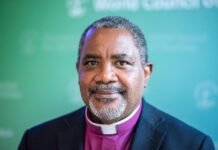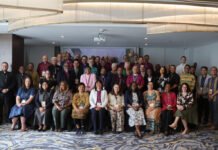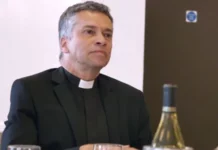The Archbishops’ Anti-Racism Taskforce has today published its report ‘From Lament to Action’ proposing a suite of changes to begin bringing about a change of culture in the life of the Church of England.
It issues a warning to the Archbishops that a failure to act could be a “last straw” for many people of UK Minority Ethnic (UKME) or Global Majority Heritage (GMH) backgrounds with “devastating effects” on the future of the Church.
The report sets out 47 specific actions for different arms of the Church of England to implement across five priority areas: participation, governance, training, education and young people.
Without these changes the Church risks denying and disregarding the gifts of a significant part of the nation, the Taskforce makes clear.
“This is the culture change that is required if the Church is to live up to its mandate of being a body where all the gifts of all its people flourish to the full, for the benefit of the church as a whole, the nation of England and the greater glory of God,” they say.
They add: “Decades of inaction carry consequences and this inaction must be owned by the whole Church.
“A failure to act now will be seen as another indication, potentially a last straw for many, that the Church is not serious about racial sin.”
The nine-strong group was set up in autumn 2020 with a double remit:
- to review previous reports relating to racial justice over 36 years and whether their recommendations have been implemented
- to prepare the ground for the establishment a longer-term Commission on Racial Justice, suggest terms of reference and remit for its work.
“In our work as the Taskforce, we have considered 25 reports from the mid-80s onwards with a total of more than 160 recommendations,” the taskforce explains.
“Since then, the Church of England has considered motion after motion, debate after debate, yet we still find ourselves in the position where – throughout our life as a church – the flourishing of UKME/GMH Anglicans is hard to discern.”
The taskforce’s work is rooted in Christian theology, they emphasise, flowing “not from identity politics but from our identity in Christ”.
The report accepts the definition of ‘Institutional Racism’ adopted by the Macpherson report into the murder of Stephen Lawrence – covering processes, attitudes and behaviour which amount to discrimination – as applying to the Church of England [see notes] and speaks of racism as a “sin” requiring repentance.
“We share together the understanding that racism is a sin,” they say.
“Racial sin disfigures God’s image in each one of us. Racial sin dehumanises people by taking away their fundamental God-given human dignity.
“Wherever racial sin flourishes systematically, either in society or in our church, we must challenge it together. We must repent of racial sin, turn away from racism and be reconciled, so that we may all experience the love of God.”
The report highlights the lack of people from UK minority ethnic backgrounds in senior leadership in the Church, noting that the new Bishop of Chelmsford, Dr Guli Francis-Dehqani, will be the only UKME or GMH diocesan (senior) bishop in the Church of England. There are four suffragan bishops from a UKME/GMH background.
“In terms of participation, the most senior level of leadership in the Church of England reveals an alarmingly retrograde trend,” it notes.
“In terms of ethnic diversity amongst diocesan bishops, when the new Bishop of Chelmsford takes up office later this year the Church of England will be back where it was 27 years ago.
“The total number of UKME/GMH bishops can together be counted on one hand (five out of 111). The number of UKME/GMH deans, archdeacons, and senior staff in the National Church Institutions only adds up to a further nine people.
“There are no UKME/GMH Diocesan Secretaries [the most senior staff role in each diocese] or Principals of Theological Educational Institutions at all.”
The report is clear that addressing the underlying issues of systemic racism is a “missional imperative” for the Church.
“Disregarding a significant part of the population, and thus denying the gifts they bring for the service of the Church, must not continue,” the taskforce warns.
The proposals include:
- An expectation that shortlists for jobs in the Church will include at least one appointable UKME candidate – and for more senior roles, right up to bishops, specific requirements to ensure this happens.
- New approaches to shortlisting and interviewing which place a duty on the employer to improve participation on an “action or explain” basis rather than relying on “bland encouragements” for under-represented groups to apply.
- Recruitment bodies including the Crown Nominations Commission, which nominates diocesan bishops, to provide “valid, publishable reasons” for failure to include UKME candidates on shortlists.
- The General Synod co-opting 10 UKME candidates (five clergy and five laity) for its next five-year term, which begins this year.
- The House of Bishops inviting UKME clergy to become participant observers until there are at least six UKME bishops in the House.
- 30% of new intakes on the Strategic Leadership Development Programme – a scheme to support clergy identified as having potential for taking on wider responsibilities – should come from UKME backgrounds, approximately 20 people from a group of 60. The figure is twice the estimated proportion of those who worship in the Church of England to begin tackling the current imbalance in the Church’s leadership by building up potential supply.
- The appointment of full-time Racial Justice Officers (RJOs) in every diocese – for a five-year term, funded centrally, alongside a new Racial Justice Directorate, within the National Church Institutions, to oversee implementation of the recommendations of the Taskforce and the Commission. (See notes for more)
Meanwhile the report suggests a range of work for the new Racial Justice Commission including considering how complaints of discrimination and racism could be handled in the future and how churches should respond to historic monuments and buildings of “contested heritage” such as links to slavery. (See notes for a full list)
Rather than attempting to erase the past or rewrite history, the report calls for a “healthy revision of memory and history in a way that will provide scope for education and formation”.
It also recommends that the new Commission should examine broad questions of how parish life itself could become more inclusive.
“One of the barriers to inclusion or continued participation in the Church of England for those from UKME/GMH and other backgrounds has been the challenge of ‘cultural assimilation’ into the Church, where there is perceived to be little or no room for cultural expression outside of a predominant culture which is predominantly white and middle class,” it explains.



